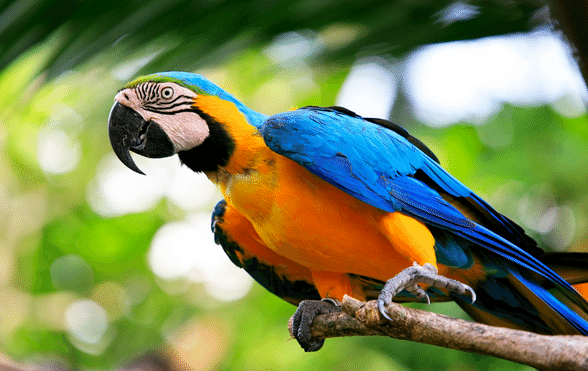Do parrots tolerate cold weather? What’s the ideal temperature for your pet parrot and how do you know if it’s ill? Read on to find out…
Is your parrot insured? Get a quote for up to £5,000 of vet fee cover, death and theft cover | We’ve been insuring exotic pets since 1996 | Check out our customer reviews on Feefo.
Article checked by vet expert Dr. Sophie Bell.
Can parrots live in cold weather?
Companion parrots do not tolerate cold weather very well.
While some parrots in the wild have adapted to colder temperatures in the winter, pet parrots are adapted to the temperature in which they were raised. It is unlikely that an indoor pet parrot would be able to cope well with living outside in the cold.
In addition, most parrots kept as pets are biologically adapted to hotter temperatures, with their ancestors originating from places like South America and Africa. Meaning they are less likely to cope well in the cold.
Owners who keep parrots in outdoor aviaries argue that the birds can adequately cope with lower temperatures in the winter if they have been acclimatised to it over time through short but frequent exposures to lower temperatures.
However, it is generally safer to ensure your birds are warm indoors during the cold months of the year.
Also in this article: How to keep pet parrots warm in the winter? | Ideal temperature for parrots | Signs your parrot might be cold | Parrot cold symptoms: signs your parrot might have a cold | What’s the best type of home heating for parrots?
How to keep pet parrots warm in the winter?
Vet expert Dr Sophie Bell advises that parrot’s are much more sensitive to draught than we are. Even if we can’t feel anything, they will be able to. Therefore its important to keep your parrot away from doors and windows.
At the same time, make sure your heating doesn’t dry the air in the room where your bird is. Birds have sensitive respiratory tracts and dry air can also make them unwell.
If your heating does make the air in the room dry, you can use a humidifier to restore the natural humidity. Regular misting can help too.
Covering your parrot’s cage at night is also a good way to keep them warm and protected from potential temperature drops.

What’s the best temperature for your parrot?
Ideal temperature for parrots
According to Dr Sophie Bell, the ideal temperature for birds is between 18 to 22 degrees Celsius. Although parrots can withstand anything up to 29 degrees.
Anything under 4 degrees Celsius might be harmful to your bird. Plumper birds might experience heat stress above 30 degrees Celsius.
Parrots benefit from steady temperatures, so it’s good to ensure the same or similar temperature is maintained in your home day and night.
Signs your parrot might be cold
Dr Sophie Bell advises that parrots may demonstrate an increased appetite if they’re feeling cold. This helps increase their metabolism, and maintain body temperature. Eventually though, their appetite will reduce.
Your parrot might be cold if it is fluffing up its feathers and burying its beak into its chest, squatting to cover its legs in feathers and shivering. A bird that is cold might also get lethargic and lose its appetite.
Is your parrot insured? Get a quote for up to £5,000 of vet fee cover, death and theft cover | We’ve been insuring exotic pets since 1996 | Check out our customer reviews on Feefo.
Parrot cold symptoms: signs your parrot might have a cold
Parrots don’t get colds but are prone to respiratory infections. Some symptoms that your bird might be suffering from a respiratory disease are:
- Difficulty breeding
- Loss of appetite
- Sneezing
- Coughing
- Excess urination
- Lethargy
- Fluffed up feathers
- Nasal discharge
Birds tend to become ill when exposed to draught or fluctuating temperatures.
When birds are ill they might try to conceal their symptoms. This is an adaptation they’ve evolved because in the wild, showing symptoms of a disease makes them more susceptible to attacks by predators.
What’s the best type of home heating for parrots?
The best type of heating for a parrot is central heating.
Types of heating to avoid are ones that produce smoke and fumes, as birds have very sensitive respiratory tracts. In this case, it might be better to keep your bird in another room.
Regardless of your heating type, it is important to maintain a stable room temperature and monitor your bird.
If it fluffs up, buries its beak in its neck and is crouching so its feathers cover its legs then it is perhaps feeling cold.
And finally…
Even though we’re focusing on parrots and the cold, we wanted to touch on heat…
Signs your parrot is too hot
According to Dr Sophie Bell, signs your parrot is too hot will include open beaked breathing and holding its wings away from its body. In extreme cases, your parrot will become unbalanced when moving around, and have seizures.
You should seek immediate vet advice if this is the case.
Is your parrot insured? Get a quote for up to £5,000 of vet fee cover, death and theft cover | We’ve been insuring exotic pets since 1996 | Check out our customer reviews on Feefo.

